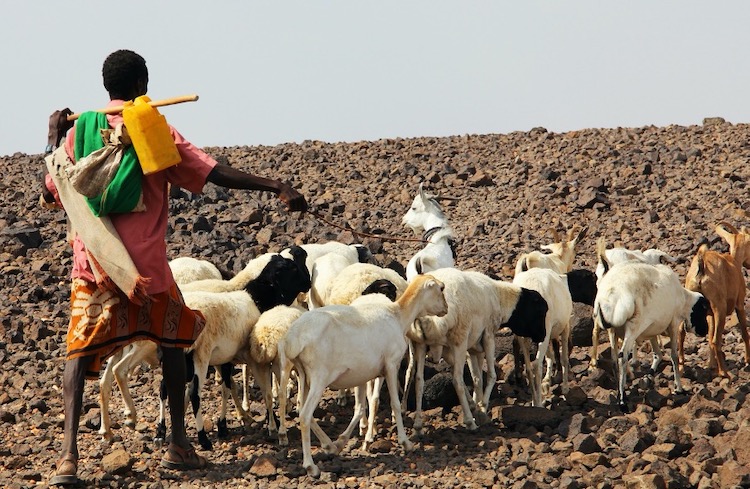
Viewpoint by Rhoda Peace Tumusiime
The writer is a member of the Malabo Montpellier Panel and former AU Commissioner for Rural Economy and Agriculture at the African Union Commission (AUC).
ENTEBBE, Uganda (IDN) – Livestock have long been the insurance policy of Africa’s poorest, with even a single goat or a chicken providing a buffer against economic hardship and hunger.
But as Covid-19 forces many to fall back on these safety nets, the need for more long-term support of the continent’s livestock sector is laid bare.
Amid increased reliance on animal agriculture to cope with shocks, together with rising demand for meat and milk from urban areas, the sustainable growth of Africa’s livestock sector is an opportunity to turn insurance into investment, recovery into resilience.
The livestock sector already provides up to 80 per cent of agricultural GDP in some countries, and has provided vital short-term relief during the pandemic for some of Africa’s millions of smallholder farmers.
From generating an emergency source of income for rural families to providing convenient and nutritious sources of food to bolster health and immunity, livestock are among the most valuable assets.
At the same time, demand for animal-source food at the height of the pandemic has surged and, as pointed out in a new report by the Malabo Montpellier Panel, is expected to outstrip production by 2050 with per capita meat consumption rising from 19kg a year to 26kg.
And yet the coronavirus outbreak has also compounded some of the challenges that have held back the sector from becoming an economic powerhouse, limiting access to markets as well as the veterinary services that underpin safe and successful livestock-rearing.
Removing barriers to sustainable growth will not only strengthen the protection livestock offers the most vulnerable, it will also provide opportunities for families, and especially women, to improve their livelihoods and assets.
As countries respond to the immediate and longer-term consequences of the pandemic, governments need to prioritise investments to bolster the African livestock sector.
This includes measures to improve the productivity of cattle, pigs and poultry by strengthening animal health through greater access to veterinarians and animal medicines.
Not only do healthy animals produce more meat, milk and eggs but they also pose a lower risk to human health and food safety.
In Ghana, initiatives such as SMS-based animal disease information services have helped share updates about outbreaks and encourage farmers to have their animals vaccinated, reducing losses and adding an estimated US$300 to their annual household income.
Improved animal health also then contributes to human health, unlocking the economic advantages of a population that thrives and reaches its full potential.
Another area of investment that will drive the transformation of the livestock sector is in the empowerment of women.
For almost 250 million African women, livestock represents their greatest opportunity for income and wealth accumulation, and where women own livestock, research shows their entire family benefits from better nutrition and food security.
Organizations such as Heifer International, FARM-Africa, and Land O’Lakes have supplied livestock to women free of charge for several years in several African countries, with evidence these interventions help reduce gender inequality, particularly in asset ownership, market participation, and income management.
Closing the livestock gender gap will require programs targeting an increase in women’s ownership of livestock for their own benefit as well as for the benefits to families, communities and economies.
Finally, growing Africa’s livestock sector requires a systemic approach to sustainable agri-food value chain development, including growing a quality animal feed industry to support the growth of the sector.
In Zambia, for example, the broiler chicken value chain alone provides approximately 31,000 jobs, of which more than 25,000 are in the traditional production system and 6,000 in the modern production system.
Estimates indicate that the broiler chicken value chain could create an additional 16,000 jobs in Zambia by 2022 due to the growing demand for poultry.
Supporting a vibrant livestock value chain will require investments into critical value chain points, to “pull” demand from subsidiary value chains like the production of feed, animal health and extension services and genetics.
To date, Africa’s livestock sector has made crucial contributions to the continent’s economic wellbeing, in particular for the most vulnerable or remote groups with few alternatives.
But as the world looks to “build back better”, Africa must raise the ambition for animal agriculture, not just to respond or recover but to lead and unlock its potential. [IDN-InDepthNews – 15 July 2020]
Photo: Pastoralist with herd, Horn of Africa. Credit: Katherine Bundra Roux, IFRC
IDN is flagship agency of the Non-profit International Press Syndicate.
Visit us on Facebook and Twitter.
This article is published under the Creative Commons Attribution 4.0 International licence. You are free to share, remix, tweak and build upon it non-commercially. Please give due credit.











